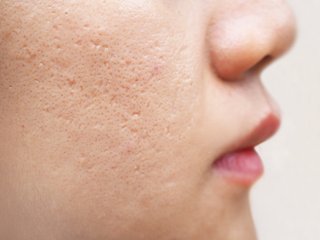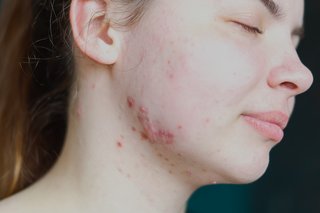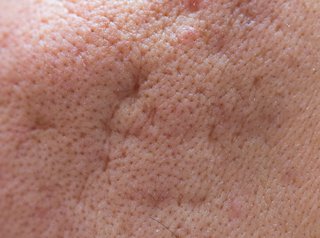Acne can start at any age but is most often because of the changes in hormone levels during puberty.
Acne runs in families. If both your mother and father had acne, it's likely that you'll also have acne.
How acne develops
Acne is caused when hair follicles (small holes in the skin that a hair grows out of) become blocked.
Tiny glands called sebaceous glands are found near the top of your skin and are attached your hair follicles. These glands make sebum. This is an oily or greasy substance that stops your skin drying out.
When you have acne your sebaceous glands make too much sebum. The sebum mixes with dead skin cells and together they block the follicle.
Cleaning your skin will not help you to remove this blockage.
Causes of different types of spots
If the blocked follicle is close to the top of your skin, it gets bigger and creates a whitehead. It can also open to the skin, creating a blackhead.
Harmless bacteria live on your skin. They can get into and infect the blocked follicles. This causes acne spots such as papules, pustules, nodules or cysts.
Your hormones and acne
Some hormones can cause you to make larger amounts of sebum.
This causes a usually harmless bacteria on your skin to overgrow. The bacteria P. acnes, causes inflammation and pus.
The hormones also make the inside of the hair follicle thicker. Your pores (opening of the hair follicles) get blocked.
Hormonal changes in adult women
More than 8 in 10 adults with acne are women.
Changes in hormone levels are a major cause.
Some women will get acne:
- before their period
- in the first 3 months of pregnancy
- if they have polycystic ovary syndrome (PCOS)
Acne triggers
From time to time, something else will trigger or set off your acne.
These include:
- some cosmetic products - get oil-free or non-comedogenic ones as they will not block your pores which leads to spots
- some medicines, for example if you take steroids, lithium (for depression and bipolar disorder) or some medicines for epilepsy
- wearing things that press against your skin such as a headband or backpack
- smoking, if you are an older adult
What does not cause acne
There are a number of myths about acne. People think it is caused by how clean your skin is, and sex or masturbating. But it's not.
Washing and acne myth
Acne is not caused by having dirty skin and poor hygiene. Most of the things that trigger acne happen underneath the skin. How clean your skin is will not stop acne. Washing your face more than twice a day could upset your skin.
Sexual activity and acne myth
Sexual activity has no influence on acne. Having sex or masturbating won't make acne any better or worse.
Causes of acne scarring
Some people with acne get acne scarring. Any type of acne spot can lead to scarring. But it's more common if you have large hard lumps or large pus-filled lumps (nodules and cysts). They can burst and damage skin near them.
Scarring can also happen if you pick or squeeze your spots. It's important not to do this.
There are 3 main types of acne scars:
Ice pick scars
These are small, deep holes in your skin. It looks like a sharp object has punctured your skin.

Rolling scars
Your skin has a rolling and uneven appearance. This is because strips of scar tissue have grown under the skin.

Boxcar scars
These are round or oval depressions, or craters, in the skin.
